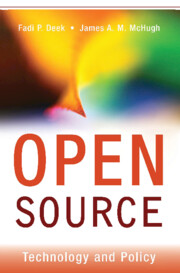Book contents
- Frontmatter
- Contents
- Preface
- Acknowledgments
- 1 Introduction
- Section One Open Source – Internet Applications, Platforms, and Technologies
- Section Two Social, Psychological, Legal, and Economic Aspects of Open Source
- Section Three Free Software: The Movement, The Public Sector, and the Future
- 8 The GNU project
- 9 Open Source in the Public Sector
- 10 The Future of the Open Source Movement
- Glossary
- Subject Index
- Author Index
- References
8 - The GNU project
Published online by Cambridge University Press: 16 January 2010
- Frontmatter
- Contents
- Preface
- Acknowledgments
- 1 Introduction
- Section One Open Source – Internet Applications, Platforms, and Technologies
- Section Two Social, Psychological, Legal, and Economic Aspects of Open Source
- Section Three Free Software: The Movement, The Public Sector, and the Future
- 8 The GNU project
- 9 Open Source in the Public Sector
- 10 The Future of the Open Source Movement
- Glossary
- Subject Index
- Author Index
- References
Summary
The Open Source Initiative represents the formalization of one stream of the free and open software movement. We have described its establishment in 1998 by Raymond and Perens, and Peterson's coinage of the term open source as an alternative to what was thought to be the more ideologically laden phrase free software. Of course, ever since the mid-1980s, the other distinct stream of the movement represented by the Free Software Foundation (FSF) and the GNU project had already been active. The FSF and Richard Stallman initiated the free software concept, defined its terms, vigorously and boldly publicized its motivations and objectives, established and implemented the core GNU project, and led advocacy and compliance for the free software movement. They have been instrumental in its burgeoning success. We have already discussed the FSF's General Public License (GPL) in Chapter 6. This chapter describes the origin and technical objectives of the GNU project that represents one of the major technical triumphs of the free software movement. We also elaborate on some of the responsibilities, activities, and philosophical principles of the FSF, particularly as expressed by FSF General Counsel Eben Moglen.
The GNU project
The GNU project was founded to create a self-contained free software platform. The project was begun in 1983 by Stallman. It had an ambitious and arguably almost utopian vision. The acronym GNU stands for “GNU's Not Unix,” a kind of recursive acronym that was popular at MIT where Stallman worked.
- Type
- Chapter
- Information
- Open SourceTechnology and Policy, pp. 297 - 308Publisher: Cambridge University PressPrint publication year: 2007



